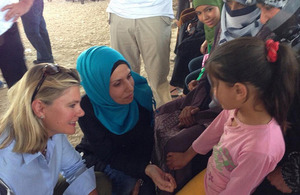New UK support for Jordan’s Syrian refugee response
Jordan will receive urgently needed support to ensure essential public services keep running as Syrian refugee numbers continue to grow

Justine Greening with refugee children in Jordan
Jordan will receive urgently needed support to keep essential public services running and prevent tensions between local people and growing numbers of Syrian refugees, International Development Secretary Justine Greening announced today.
The UK will provide £12 million over the next two years to ensure that local Jordanian municipal governments can meet the needs of both host communities and refugees who have fled the fighting in Syria.
Competition for jobs is increasing, houses built for refugees require electricity and water, and rubbish is piling up. British support will help to maintain road construction and maintenance, waste collection, street lighting, pest control and water supplies. It will focus on areas with high numbers of refugees, particularly in northern Jordan.
Justine Greening said:
The people of Jordan have been incredibly generous in opening their doors to Syrians in desperate need. But with around 250,000 refugees arriving in 2013 alone, the Syrian crisis is placing a huge strain on communities and services.
Some neighbourhoods now have twice as many people living there as before, so it makes sense to invest in schools, health and other basic services to help everyone who has been flung together through no fault of their own.
Our support is vital for refugees, the host communities and for Britain too, because a region able to absorb refugees in the short or medium term is resolutely in our interests.
More than 520,000 refugees have now fled to Jordan to escape the fighting in Syria, around half of them children. Although many are in camps like Za’atari, more than two thirds are staying in towns and cities where they share space, resources and services with their Jordanian hosts.
The Government of Jordan estimates the financial impact of providing public services at about $250 million for 2012 and the first quarter of 2013 and municipalities have struggled to maintain services in the face of rapidly growing numbers of users.
The rising demand and lagging supply of housing has led to significant increases in rental costs, especially in northern towns, and renting suitable and affordable housing has become harder for Jordanians. Investors have been constructing new housing, which has resulted in the establishment of new neighbourhoods needing roads, street lighting and connections to electricity, water and sewage networks.
Rubbish is piling up in many urban centres. In cities like Irbid and Mafraq, waste has doubled by some accounts, leading many municipalities to overwork their waste collection fleets.
In addition, high unemployment has highlighted the need for municipalities to take on a more active role in promoting local economic development and creating job opportunities.
This new funding commitment is in addition to the £500 million that the UK has now committed in response to the humanitarian crisis in Syria, the largest ever response from the UK to a single crisis. This is providing support including food, medical care and relief items for over a million people in Syria and the region.
Related government links
For full details of the UK’s Syria crisis humanitarian response, visit our latest updates page
Notes to editors
- The new funding comes from the Arab Partnership Economic Facility and will be channelled through the World Bank-managed Jordan Emergency Services and Social Resilience Programme.
- The funding commitment was announced by the International Development Secretary in Washington today, at a World Bank-run event which was also attended by the Jordanian Minister for International Co-operation, Dr. Ibrahim Saif.
General media queries (24 hours)
Email mediateam@dfid.gov.uk
Telephone 020 7023 0600
If you have an urgent media query, please email the DFID Media Team on mediateam@dfid.gov.uk in the first instance and we will respond as soon as possible.